|
|
St Eumenius, Bishop of Gortyna in Crete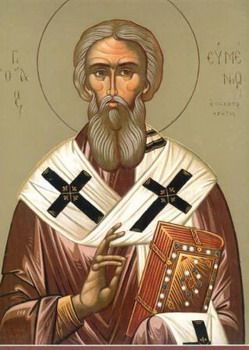 He gave himself to Christ with his whole heart from his youth, freeing himself of two heavy burdens: the burden of riches and the burden of the flesh. He freed himself from the first by giving away all his goods to the poor and needy, and from the latter by strict fasting. He thus healed himself and was able to heal others. Passionless and filled with the grace of the Holy Spirit, Eumenius shone with a radiance that could not be hidden, as it is written: "A city set on a hill cannot be hid" (Matt. 5:14), and so holy Eumenius could not be hidden from the world. Seeing him, the people chose him as their bishop in Gortyna. As a bishop, he governed Christ"s flock as a good shepherd. He was a father to the poor, riches to the needy, consolation to the sad, healing to the sick and a marvellous wonderworker. He worked many miracles by his prayers: he killed a poisonous snake, drove out demons, healed many of the sick, and did this not only in his home city but in Rome and in the Thebaid. In the Thebaid, he brought rain from God in a time of drought, and there finally finished his earthly course and entered into the eternal presence of his Lord. He lived and worked in the seventh century. He gave himself to Christ with his whole heart from his youth, freeing himself of two heavy burdens: the burden of riches and the burden of the flesh. He freed himself from the first by giving away all his goods to the poor and needy, and from the latter by strict fasting. He thus healed himself and was able to heal others. Passionless and filled with the grace of the Holy Spirit, Eumenius shone with a radiance that could not be hidden, as it is written: "A city set on a hill cannot be hid" (Matt. 5:14), and so holy Eumenius could not be hidden from the world. Seeing him, the people chose him as their bishop in Gortyna. As a bishop, he governed Christ"s flock as a good shepherd. He was a father to the poor, riches to the needy, consolation to the sad, healing to the sick and a marvellous wonderworker. He worked many miracles by his prayers: he killed a poisonous snake, drove out demons, healed many of the sick, and did this not only in his home city but in Rome and in the Thebaid. In the Thebaid, he brought rain from God in a time of drought, and there finally finished his earthly course and entered into the eternal presence of his Lord. He lived and worked in the seventh century.The Holy Martyr Ariadne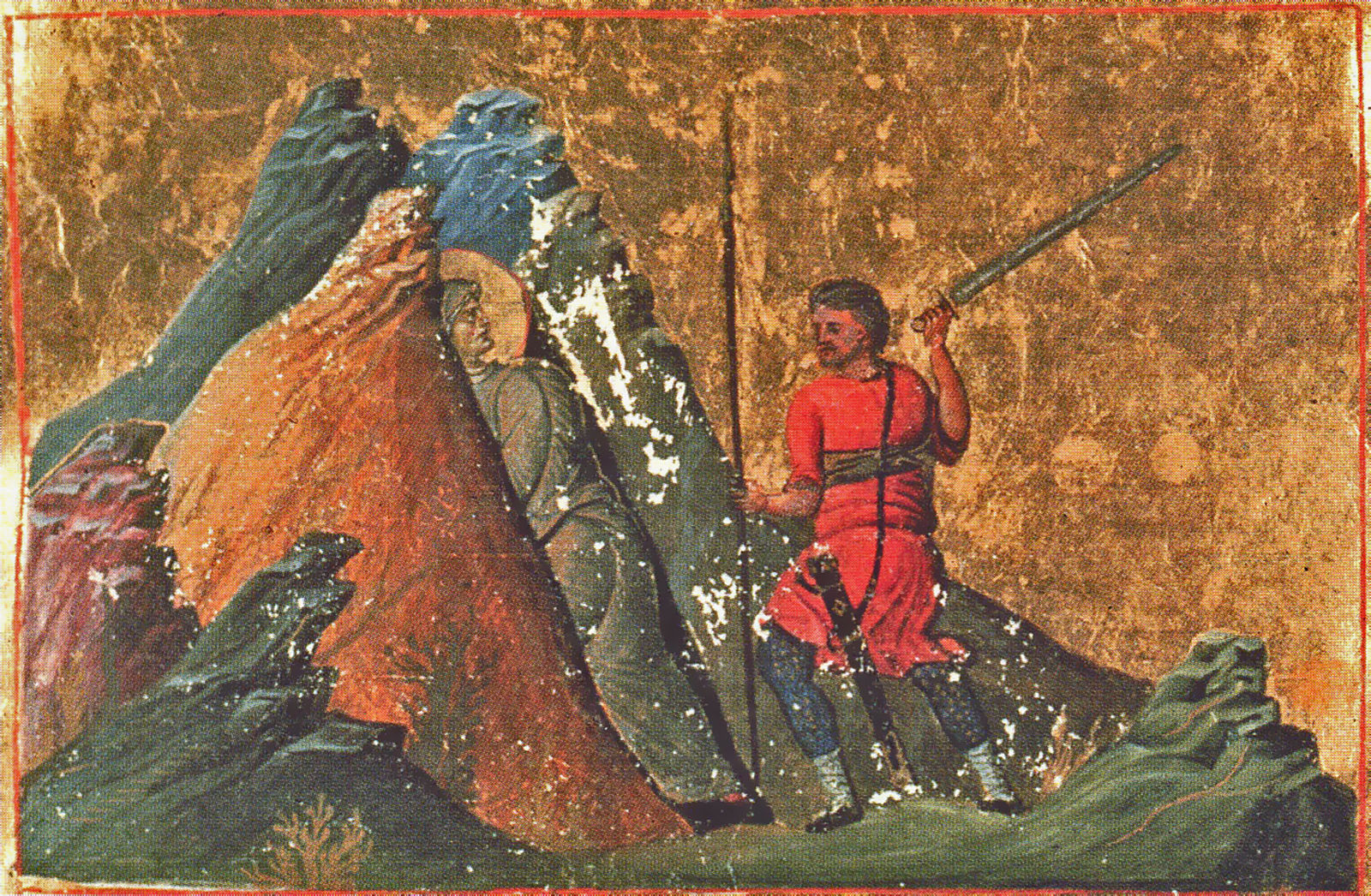 In the town of Promisea in Phrygia in the time of the Emperor Hadrian (117-138), there lived a pagan patrician, Tertullus. The maiden Ariadne was a slave of his, and a Christian. On his son"s birthday, Tertullus ordered a great sacrifice to the idols, in which Ariadne did not take part, staying at home and praying to the true God. Her owner was furious with her for this, and put pressure on her to deny Christ and worship idols. When Ariadne refused to do this, he had her whipped and tortured in other ways, then threw her into prison. He soon released her from prison and drove her from the house, but quickly changed his mind and sent servants to bring her back. Ariadne was already a long way from the town. When she saw her persecutors, she prayed to God beside a great rock, and the rock opened and hid her. The servants were nonplussed at this, quarrelled among themselves and came to blows, and so perished at one another"s hands. In the town of Promisea in Phrygia in the time of the Emperor Hadrian (117-138), there lived a pagan patrician, Tertullus. The maiden Ariadne was a slave of his, and a Christian. On his son"s birthday, Tertullus ordered a great sacrifice to the idols, in which Ariadne did not take part, staying at home and praying to the true God. Her owner was furious with her for this, and put pressure on her to deny Christ and worship idols. When Ariadne refused to do this, he had her whipped and tortured in other ways, then threw her into prison. He soon released her from prison and drove her from the house, but quickly changed his mind and sent servants to bring her back. Ariadne was already a long way from the town. When she saw her persecutors, she prayed to God beside a great rock, and the rock opened and hid her. The servants were nonplussed at this, quarrelled among themselves and came to blows, and so perished at one another"s hands.The Holy Martyr Bidzini, Prince of Georgia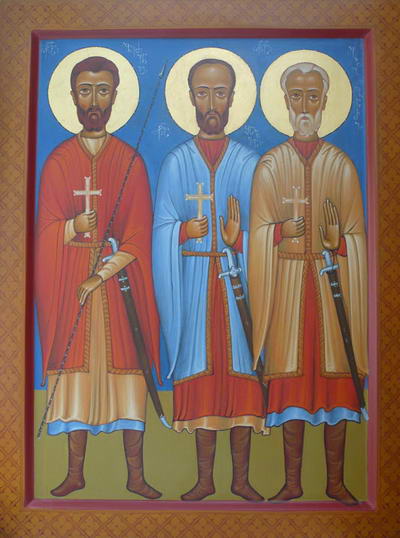 He died for the Christian faith under Shah Abbas II in 1661, together with his kinsmen Elisbar and Shavel. He died for the Christian faith under Shah Abbas II in 1661, together with his kinsmen Elisbar and Shavel.St. Arcadius, bishop of Novgorod (1162)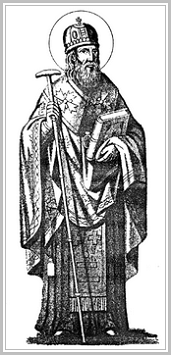 He was elected bishop from among the hegumens of the Dormition Arcadius Monastery near Novgorod founded by him in 1153. And he worked hard at calming the upheavals of the people and the reconciliation of princes. He died in 1163, having left the memory of himself as a meek bishop and the child-loving father of orphans and the needy. The monastery he founded was abolished in 1764. He was elected bishop from among the hegumens of the Dormition Arcadius Monastery near Novgorod founded by him in 1153. And he worked hard at calming the upheavals of the people and the reconciliation of princes. He died in 1163, having left the memory of himself as a meek bishop and the child-loving father of orphans and the needy. The monastery he founded was abolished in 1764.Martyrs Sophia and Irene of Egypt (3rd c.)Martyr Castor of Alexandria
Martyrs Prince Elizbar and Prince Shalva of Ksani, Georgia (1661) 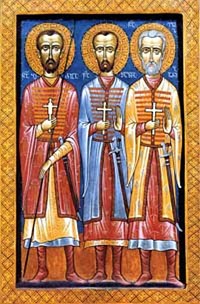 The Martyrs Bidjen (Cholokashvili), Shalva and Elizbar of Xana – were Gruzian princes who liberated Kakhetia (Eastern Gruzia/Georgia) from the Persians. At the demand of shah Abbas II all three were handed over to him, with the connivance of the Gruzian emperor Vakhtang V (1658-1675), who had accepted Islam and became known under the name Shah-Navaza... The Martyrs Bidjen (Cholokashvili), Shalva and Elizbar of Xana – were Gruzian princes who liberated Kakhetia (Eastern Gruzia/Georgia) from the Persians. At the demand of shah Abbas II all three were handed over to him, with the connivance of the Gruzian emperor Vakhtang V (1658-1675), who had accepted Islam and became known under the name Shah-Navaza... |